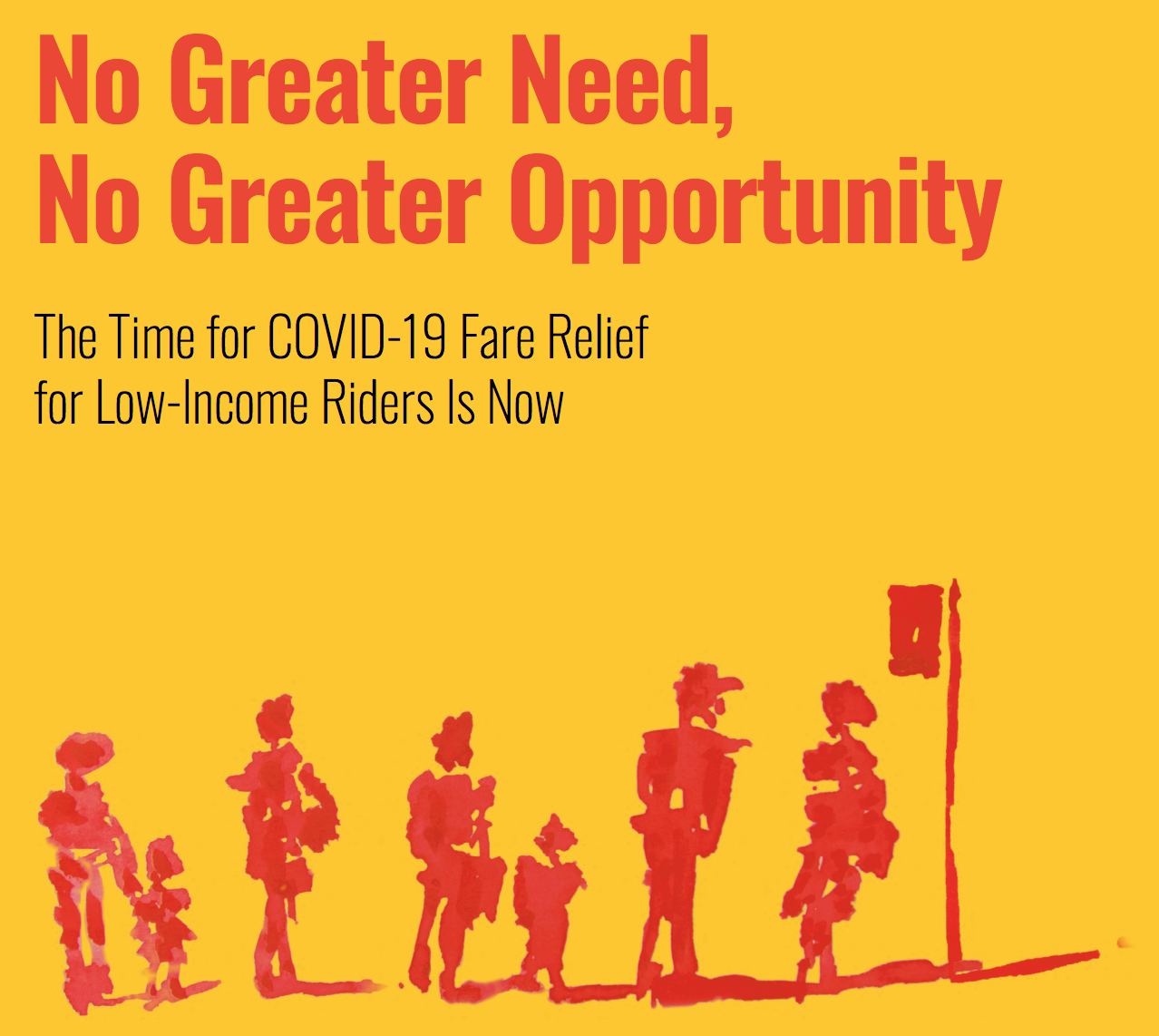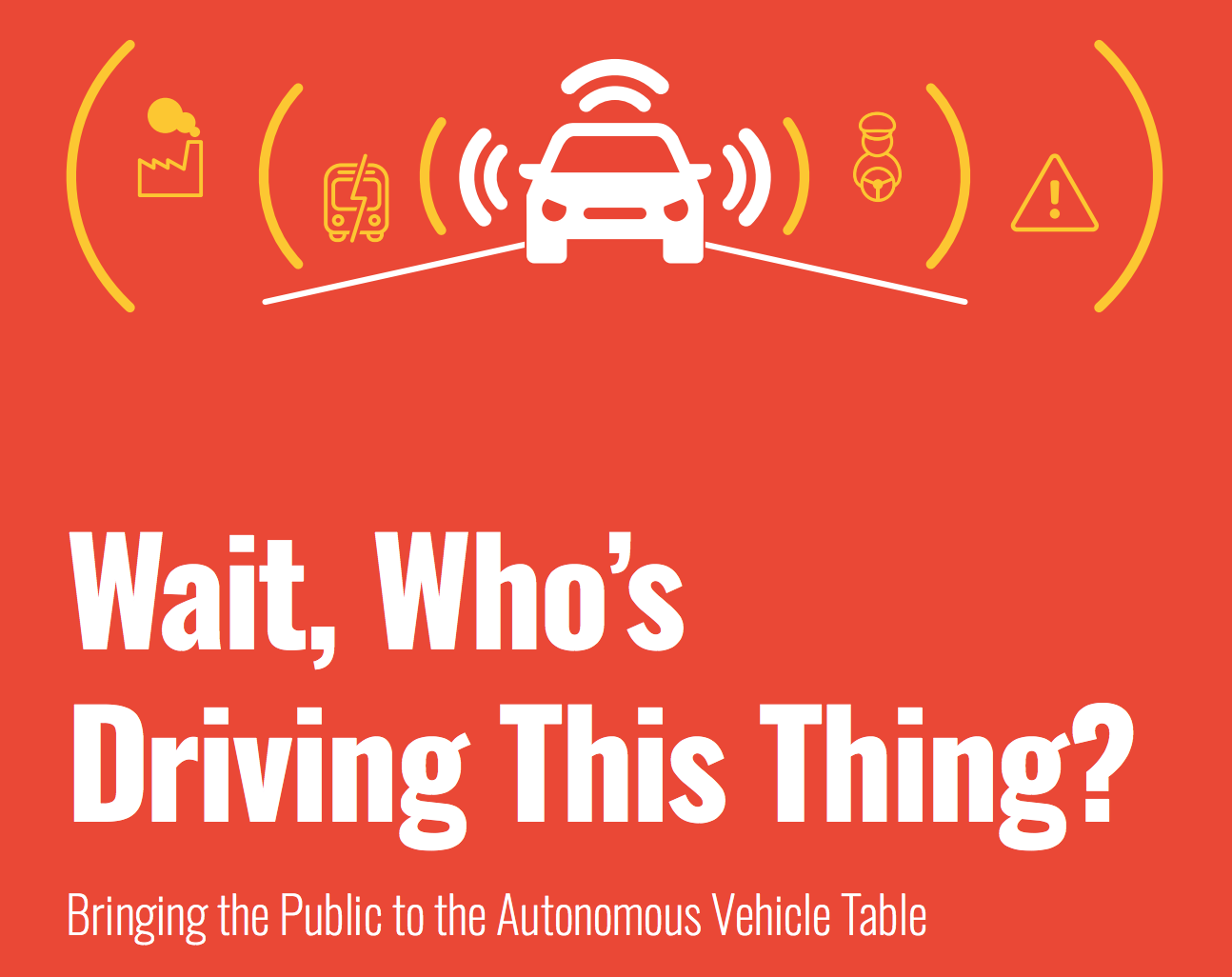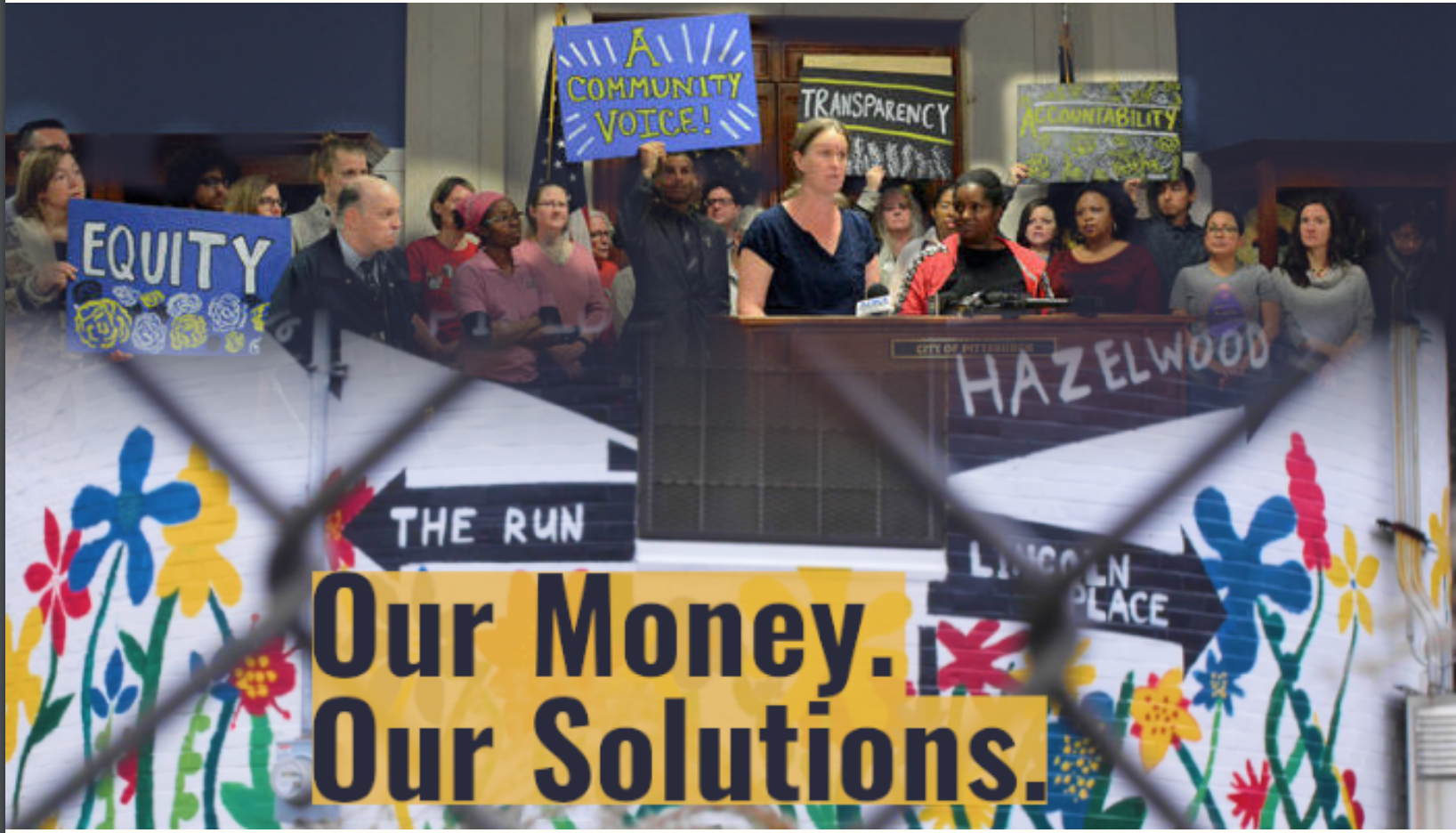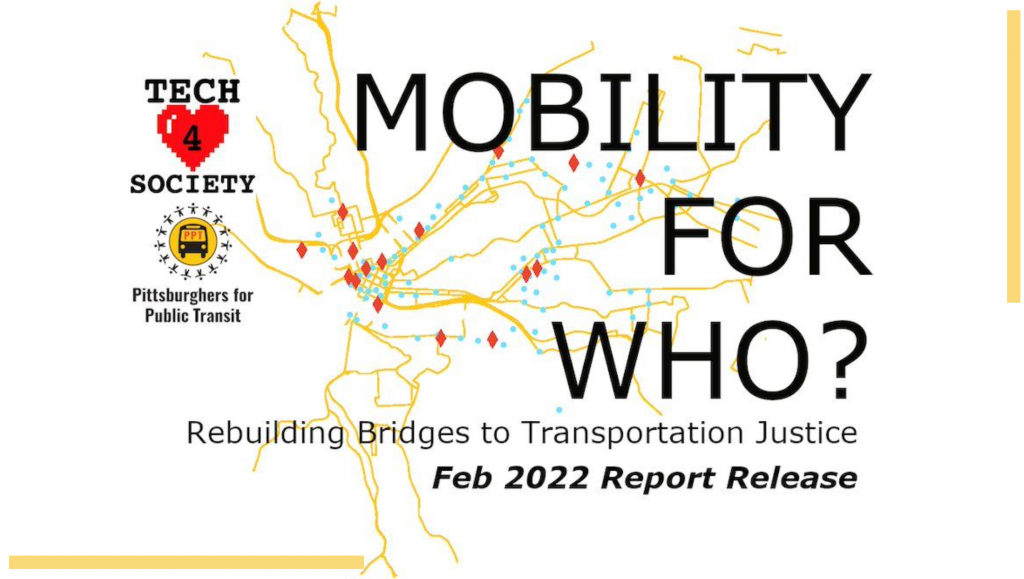PPT has an active research committee who conduct research for our campaigns. We also compile resources and articles that are relevant for transportation issues and concerns in our region. Below are resources based on this research.
Have questions or want to get involved? Contact info@pittsburghforpublictransit.org
No Greater Need, No Greater Opportunity

Public transit riders in Allegheny County have been hit hard by COVID-19. Transit riders during this pandemic are disproportionately Black and low-income, and experiencing the dueling crises of the economic downturn and the coronavirus. The Port Authority of Allegheny County is a public agency, charged with providing reliable, accessible service to its riders during a unique and difficult moment. On March 25, 2020, Port Authority implemented rear-door boarding on all of their vehicles and cordoned off the front doors to all riders except those with disabilities, a practice adopted by many transit agencies in the U.S. to prevent COVID-19 transmission at the farebox. This allowed Port Authority to become a de-facto fareless transit system for two and a half months, until front door boarding and full fare collection was reinstated on June 8, 2020.
Unlike Port Authority, some transit agencies like DC’s Metrobus, Detroit’s DDOT, Southeast Michigan’s SMART, Charlottesville’s CAT, and the Greater Richmond Transit Company have continued to maintain rear-door boarding and still allow all riders to take transit without paying fares. Los Angeles is currently considering a fareless transit system. While we understand that transit funding is in crisis, we believe that the remedy is not to extract fare revenue off the backs of those who can least afford to pay. Like other public utility providers, the Port Authority leadership must recognize that there is an ongoing emergency, which requires decisive action around fares and service provision to keep our riders and the public transit system afloat.
Read the full report here.
Join our coalition for Fair Fares!
Affordable Fares
Equitable Fares infographic* (infographic – date)
Who pays for public transit? (infographic – date)Funding for Public Transit: The Problem and a Solution (White paper – March 2016)
*Thanks to Earl Pearson for creating these documents.
Transit Police and Off-board Fare Payment
Transit policing and enforcement cost cities thousands and millions of dollars every year for fare evasion, often criminalizing those least able to afford public transit. Like Community Service Society, PPT thinks fare evasion should be decriminalized and the city resources currently spent on transit policing should be used to help the economically disadvantaged access transit instead of punishing them for being poor.
Check out this great 2016 report about fare evasion done by the Community Service Society of New York
(Download [4.56 MB) and this report compiling fare evasion statistics and research Download (PDF, 117KB)***
*** Many thanks to DePree Hopkins for their research
Representing Our Routes
Representing Our Routes: The State of Public Transit and How the City Can Improve It” February 2023
Authored by Pittsburghers for Public Transit and CMU’s Tech4Society, with
leadership by Bonnie Fan, Rahul Amruthapuri, Jim Keener, Ricardo Villareal,
Amy Zaiss, Ziggy Edwards, Laura Chu Wiens and Emily Howe
PPT’s Representing Our Routes report is intended to show the negative impacts of low service reliability on riders’ access to jobs, healthcare, and overall quality of life through riders’ lived experiences and PRT service data. We aim to amplify riders’ stories, motivate constituents to contact their City Council members about their transit service and infrastructure access concerns and provide City Council members with the necessary data to understand the role transit plays in their respective districts. As the voice of their constituents, Pittsburgh City Council members have the ability to improve communication and collaboration with PRT to ensure that transit is as reliable as electricity and water.
Through this report, we will offer Pittsburgh City Council members tangible ways to increase access to quality transit through the land use and infrastructure recommendations laid out in the Pittsburgh 100 Days Transit Platform, and models for city officials advocating for better transit service sourced from our region and beyond.
Transit Deserts
” Don’t Leave Transit Deserts High and Dry” October 2014
By: Nick Coles and Molly Nichols“Pittsburghers for Public Transit recognizes the potential value of capital investments in public transit infrastructure and expects the process to include public consultation with riders, drivers, residents and other stakeholders. In the meantime, resources allocated toward the development of bus rapid transit should not take away from meeting the needs of Allegheny County residents who have no public transit or are severely underserved.”
Beyond the East Busway Policy Brief
We at Pittsburghers for Public Transit (PPT) conducted an intensive GIS planning survey with more than 500 residents– principally Port Authority transit riders– of the Mon Valley and Eastern Suburbs over 2019 and 2020. 16 community leaders from the region were hired to conduct the outreach at bus stops, food pantries, health centers, and Community Days to develop recommendations for rapid transit corridors to serve key destinations and to address existing transportation barriers.
Read the Beyond the East Busway Policy Brief, 2021
Greening the Fleet
This document provides a brief analysis of what sustainable transportation planning means and the opportunity for public transit, specifically city buses, which account for 40% of passenger miles, to serve as a visible demonstration for the development and use of alternative fuel technology.
Sustainable Transportation: Environmental Benefits and Challenges of Alternative Fuels (April 2015)
Local Transit & Housing Maps
- Median Household Income in Allegheny County (2000-2010)
- Transit Lines and African American Population (2000-2010)
- Zero Car Households in Allegheny County (2000-2010)
- Affordable Housing Near Transit in Allegheny County and Pittsburgh
Affordable Housing
Low-income communities, dependent on transit and affordable housing, face a housing and transit crisis and an increasing risk of displacement in Pittsburgh and Allegheny County. For more information, see this map infographic**
**Thanks to Lora Matway for these map infographics and research.
Displacement Survey & Analysis
From 2017 to 2018, PPT staffer Crystal Jennings worked to locate and connect with more than 70 people who had been displaced from their homes to get a better picture of the effect that displacement had on their access to food, work, childcare, healthcare, social connections, and other essential needs. Additionally, Crystal documented their ideas about how to stop gentrification and support people at risk of displacement. This survey remains one of the only resources that document direct individual experiences of the displacement process.
Following the survey, Crystal and PPT worked with the CMU student-led group Tech for Society (link to their Twitter account)to analyze people’s responses to give a broad picture of the effects of housing displacement.
- PPT’s Displacement Survey Analysis available here
Autonomous Vehicles

We at PPT believe that we are long overdue for a public discussion of the impacts of Autonomous Vehicles. This is a conversation that should begin by examining our shared values and considering whether AV is truly the best way to address our collective needs.
PPT worked with a team of researchers at the University of Pittsburgh to assemble a Literature Review and Position Paper that was released on July 18th, 2019. This report is an important starting point for the public to evaluate the claims of autonomous vehicle companies, and to call for a truly open discussion of what we want “progress” to look like.
See a Copy of the Full Paper Here
See a Copy of the 1-Page Summary Here
A People’s Audit of the Mon-Oakland Connector

The City of Pittsburgh’s proposed Mon-Oakland Connector (MOC) purports to ease “moving among Hazelwood, Greenfield, Oakland, and Squirrel Hill without the use of a personal vehicle … [as well as allow] residents in the Hazelwood neighborhood to access jobs and amenities in these other neighborhoods.” The City allocated $23 million from its unrestricted Capital budget to build a new roadway through Schenley Park between the Hazelwood Green development site and Carnegie Mellon University (CMU) & Pitt campuses. The proposed roadway would exclusively serve a number private-operated but publicly accessible “micromobility solutions” like shuttles, e-scooters, and pods.
Residents of affected neighborhoods have put forward an alternative transportation plan entitled, “Our Money, Our Solutions”. Their plan centers Port Authority transit service improvements.
This report, written by Tech4Society and PPT, shows that resident recommendations around public transit improvements would be vastly more effective at achieving the mass mobility goals laid out by residents, the City and the stakeholder institutions – like Hazelwood Green, CMU, Pitt, and UPMC – than the proposed MOC roadway through Schenley Park. We break it down for you in the following analysis.
Mobility for Who? Rebuilding Bridges to Transportation Justice

“Mobility for Who? Rebuilding Bridges to Transportation Justice” is a new report co-authored by Tech4Society and Pittsburghers for Public Transit. The report will both highlight the critical issues that come from tech-focused transportation policy, and uplift opportunities for the new Mayoral Administration to create access for all – namely through supporting public transit, affordable housing, and accessible pedestrian infrastructure as included in the Pittsburgh 100 Days Transit Platform.
The report’s authors hosted a webinar on February 17, 2022 to discuss the new report’s findings. You can view that webinar here.